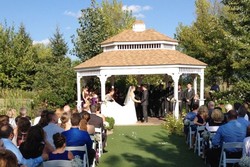When you want peace of mind as you plan your wedding, you must be certain that you and your vendors are on the same page, and there are no misunderstandings. That’s why your contract with each vendor — photographer, caterer, DJ, florist, baker, etc. — must be as specific as possible about what you’re getting and when. The more you have in writing, the less uncertainty you’ll face, and the greater the likelihood you’ll have the time of your lives. Here’s how to avoid the traps that come with too many vendor service agreements.

Be specific about what you want. Agree upon exact times for the setup of the room, the delivery of the cake, the start of the music, the arrival of the photographer and so forth. If it’s not in writing, a sloppy vendor can claim that you never settled on a final timeline. Whether it’s the number of centerpieces, the number of wedding photos, the number of hours of music, the number of meals, or any other vital part of your wedding, a written contract with every detail is your best protection.
Read and verify. Once your contract is complete, don’t just assume everything is in there and sign it without reading it. That’s a big mistake! If you let a questionable vendor off the hook by not forcing him/her to put everything in writing, you can’t come back later and say, “You assured me that you would do this.” If it’s not in writing, it wasn’t assured.
Find the sneaky fees. Reputable vendors will list them all upfront. A venue that handles your cake-cutting may charge a separate fee for cutting and serving. A DJ may charge extra for premium lighting or a second sound system. Vendors that sell products may charge sales tax, without listing it as part of their quoted prices. A photographer may charge extra for staying beyond his scheduled finishing time because you haven’t thrown your bouquet and garter yet. With each contract, ask yourself, “If this vendor delivers exactly what’s in this contract, and nothing more, will I be happy?” If the answer is yes, you’re good to go.
How do I pay, and when? Your vendors should tell you how much of a deposit they require, and when your balance is due. And they should let you know what forms of payment they accept.
Who is my service provider? If you hire a big photography company or DJ company with lots of people, and you found a specific photographer or DJ you want, be sure your contract specifies that you’re getting that person and not a last-minute substitute. Some disreputable companies will assign their best vendors early, then secretly reassign them if a high-paying customer comes along after you’ve already expressed a preference for that person. There’s nothing wrong with adding a clause that gives you the right to back out of your agreement with no forfeiture of your deposit, or adding language that cuts the price in half if someone else is substituted for your preferred service provider.
Where can each vendor be reached on my wedding day? If you have a day-of planner, or if one of your attendants will have a list of your vendors, you need to have a direct phone number to each vendor, not a voicemail message or a switchboard number. If your baker is late with your cake, you need to be able to call the right person, right away, not just wait and hope.
Be insured. Your vendor contracts should state that the vendor is responsible for getting any necessary insurance coverage your venue may require. You don’t want to get a call from the venue, two days before your wedding, asking you to buy a $200 one-day liability policy because your vendor is uninsured.
Know what each vendor requires from you. If your wedding is outdoors, practically all of your vendors will need protection from rain and hot sun. Be sure your venue has enough electrical outlets, with enough capacity to handle your DJ’s sound system, your lighting, your cooking equipment, your photographic equipment and everything else you’ll need to power your party. An outdoor wedding at a park district picnic ground will probably require a portable generator or several generators. Make sure your contract is clear about what the vendor is providing and what you must provide (or pay for).
What about after the wedding? Remember, your photographer’s work isn’t finished when the last note of music is played. He still has to develop your pictures, send you proofs, let you choose the ones for your album, and create the album — and not just when he gets around to it. Set a written deadline for full delivery, and stipulate that the price drops by an agreed-upon percentage for each week the pictures are late.
Protecting yourself upfront will ensure that your wedding will be stress-free and fun, and you’ll be able to simply enjoy yourselves while your wedding professionals take care of the details.
© Fourth Estate Audio, 2017 – Jay Congdon is president of Fourth Estate Audio, a professional Chicago DJ and Chicago Wedding DJ company.
comments powered by Disqus
